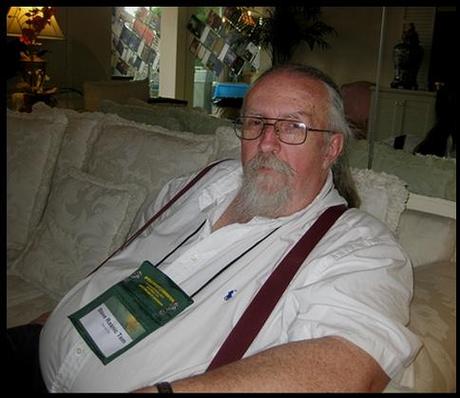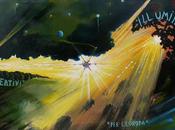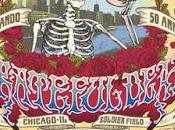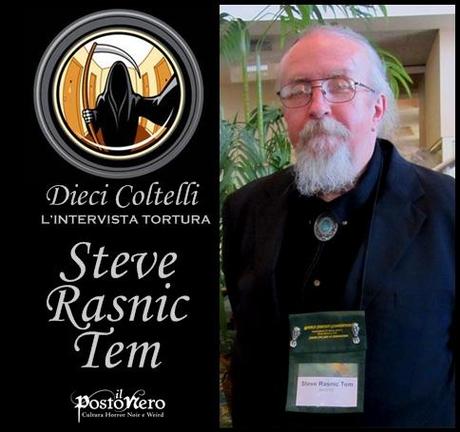
Ten Knives Interview with Steve Rasnic Tem:
Knife 1: Please name at least three contemporary authors who write generally better than you do and why.
[Steve Rasnic Tem] Wow - I'm embarrassed to say there are so many. Allow me to list three who write better than almost everyone: Cormac McCarthy, who can make a description of a character merely walking across the room interesting, Toni Morrison, whose prose is as perfect as her handling of character, Lorrie Moore, perhaps our greatest living short story writer, who combines humor with serious content seemingly effortlessly. What keeps me going, and which I often tell students who feel discouraged when they compare themselves to better writers, is that you are the best person to tell your own stories, and that in fact if you don't tell them no one else will. I want to write the best Steve Rasnic Tem stories I can, and that's enough for me
Knife 2: Has ever something happened in your life that made you think give up writing?
[Steve Rasnic Tem] I've played with the idea, as a kind of thought experiment, when I've felt burned out, and especially after our son died in 1988, when just the sound of my own voice inside my head was unrecognizable to me. But the idea has never seriously taken hold, perhaps because writing is so central to how I function within the world, and to how I deal with life's contradictions
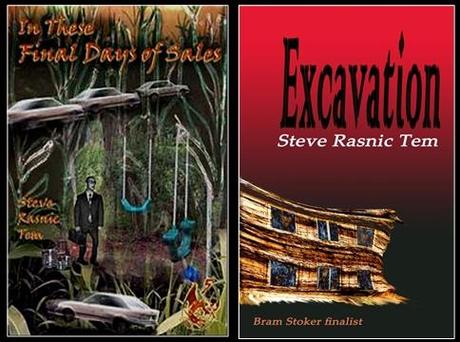
Knife 3: Which compromises did you have to accept for commercial reasons?
[Steve Rasnic Tem] As a short story writer, very few, because you can always find another market. And I have a day job as a technical writer - which shields me from the financial need to compromise. Occasionally I've played in someone else's playground, however, using someone else's characters on a work-for-hire basis, and in those cases you have to play by their rules and their vision of the character. Novels are a bit more problematic in that you know there are some ideas which are going to simply be too difficult to sell, so some initial filtering of the imagination takes place. But you have to be careful about that. Most writers, I think, censor themselves unnecessarily.
Knife 4: Is it very important to win literary prizes? Does it help to sell?
[Steve Rasnic Tem] I've won a few, and I treat them as nice surprises, events which help you keep going through all the dissappointments, but they are certainly nothing to plan for, and making them your goal can distort your process I think. I don't think the average reader cares whether you've won an award or not. Some major awards - the Hugo, the Pulitzer - do help sales, especially to libraries, but I believe most of the awards do not
Knife 5: When you have no ideas for writing, how do you bring down yourself and whom do you phone to?
[Steve Rasnic Tem] I can't think of a time I had no ideas. Usually it's an issue of having too many, and choosing the most promising one. Sometimes I try to generate ideas at random, however, throwing disparate words together, in order to break myself out of a rut.
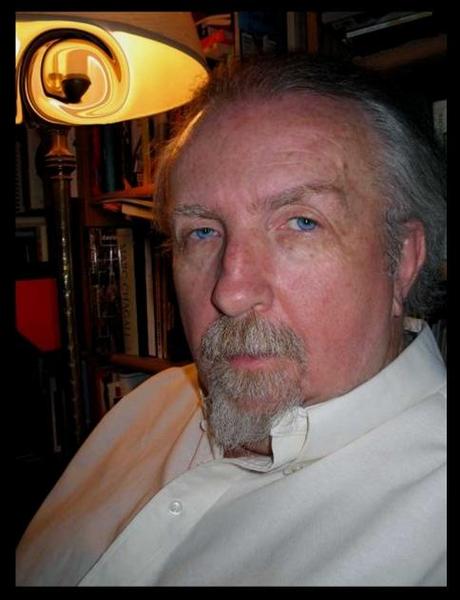
Knife 6: What do you think when you read your country's best seller rankings?
[Steve Rasnic Tem] I'm just glad that people are still reading and buying books. Some people become upset because they think the best work isn't reflected by the sales rankings, but that's always been true. Good writing sometimes contributes to popularity, but it's not the major factor involved. It's about how people's buttons are pushed, and that process is still largely a mystery.
Knife 7: What do you reproach to American publishing? What are its limits?
[Steve Rasnic Tem] While publishing is a business, it's often a rather dysfunctional one. The returns system in the US has never made much sense, we still understand book promotion poorly, and writers work very hard for too little pay, on average. There is at least an impression of confusion in publishing, in part because there's disagreement over the final impact of electronic books, and editors seem to be rather cautious at the moment. If I have a major complaint it is that book publishers and editors now often take much too long to get back to authors about submissions - it's making it almost impossible for some freelancers to make a living writing anymore
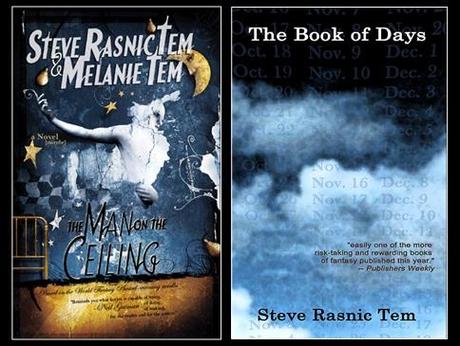
Knife 8: How many times have you refused to participate to a no-profit project?
[Steve Rasnic Tem] If you mean work for free it's something I almost never do, unless it's a very special project I want to be a part of or if it's for a charity I particularly believe in. But charity anthologies often have a hard time making enough money in a timely fashion to actually benefit their cause - so I'm more likely these days to donate a signed item for an auction than to write a story for a charity anthology. As for working for no pay or next to no pay - generally I believe people shouldn't become publishers until they can afford to pay writers a decent wage. Claims that they are giving authors "invaluable exposure" are usually nonsense, and more than a little arrogant. There are some justifiable reasons to work for very little, but at the same time writers have to be careful to preserve their resources, both financial and intellectual. Use up too much of either one and it's difficult to continue
Knife 9: What did you do right after signing major book deal?
[Steve Rasnic Tem] I might go to a movie, and spend a little extra at a bookstore. Nothing extravagant. I've crossed that age 60 line - have to preserve my resources (of all kinds).
Knife 10: Final question: Whom to (or to what) would you throw a knife?
[Steve Rasnic Tem] Unless you're an expert knife-thrower, the likelihood of having the blade actually stick into something is pretty small, and you've just given your assailant a weapon. Better to use a baseball bat, I think, if your grip is strong. If you're a writer, I suppose you could throw a book, or a stapler. But only in self-defense, of course
Leggi l'intervista in Italiano
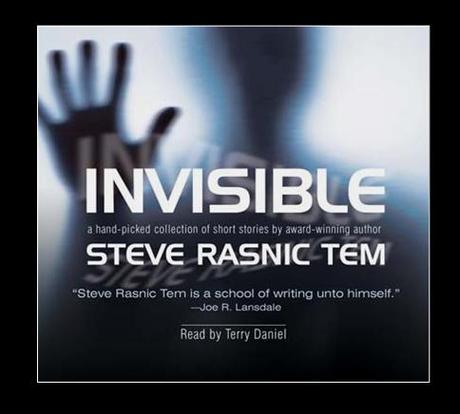
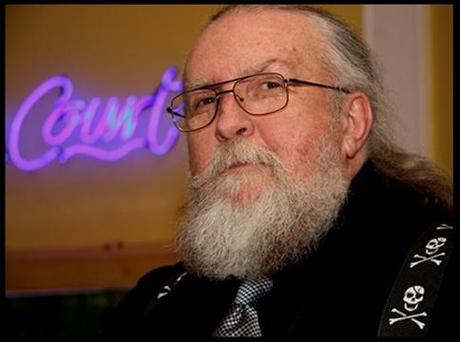
Guest ProfileSteve Rasnic Tem (1950 Jonesville) studied creative writing at Colorado State University, is an horror and fantasy fiction writer. His 300 plus published pieces have garnered him several international awards, such as Bram Stoker Award, the British Fantasy Award, The World Fantasy Award, International Horror Guild Award and many others Among his works: Excavation (1986), The Man on the Ceiling (2000 with Melanie Tem) In These Final Days or Sales (2001) Book of Days (2002), Invisible (2005) His latest book is DeadFall Hotel (Centipede Press 2011), now available in illustrated and signed limited edition hardcover, that will be released for mass market for Solaris Books in paperback and ebook edition in April 2012 Web Site. Sito Web
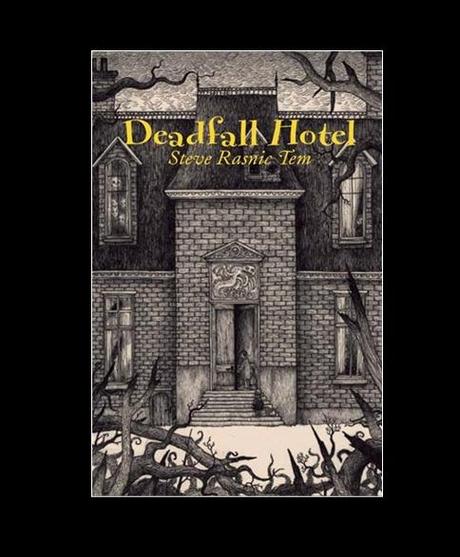
DeadFall Hotel by Steve Rasnic Tem (Centipede Press)
Reminiscent of Ray Bradbury with the atmosphere of Edward Gorey, Deadfall Hotel guides you through a season spent in the ultimate haunted hotel. Told through the story of a widower who takes the job of manager at a remote hotel where the guests are not quite like you and me, Deadfall Hotel chronicles what happens when nightmares seek a place of sanctuary. This literary exploration of the roots of horror in the collective unconscious may be the Bram Stoker, British Fantasy, and World Fantasy award-winning author’s finest creation to date. This is an original publication: a new novel, published for the first time. The book is illustrated with ten new artworks created by Danish artist John Kenn Mortensen. His drawings evoke the spirit of Edward Gorey but have a sardonic sense of humor all their own. The book has illustrated endpapers, a full printed cloth binding, ribbon marker, head and tail bands, and a reinforced binding. In addition to the novel, there is an afterword by Tem, the original story Bloodwolf, published in Shadows, and a new story, Skullbees, which will not be reprinted anywhere. The story was written specifically for one of the Mortensen illustrations. Each numbered copy signed by Steve Rasnic Tem and John Kenn Mortensen. The edition is limited to 300 copies for sale. Publisher Link
